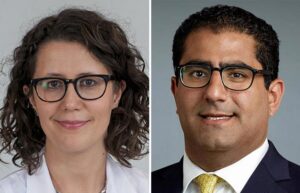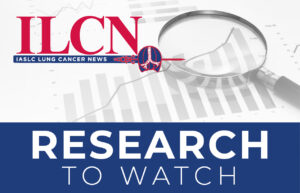A 14-gene molecular assay may offer clinicians a new, data-driven approach to making post-surgical treatment decisions for patients with early-stage non-squamous non-small cell lung cancer (NSCLC). This molecular treatment stratification test successfully identified a high-risk population of patients with stage IA-IIA non-squamous NSCLC who may benefit from chemotherapy after surgery, according to recent results from an international clinical trial.

The late-breaking findings were presented at the 2025 American Society of Clinical Oncology (ASCO) Annual Meeting in Chicago.
“This is the first large prospective randomized trial to demonstrate that a 14-gene molecular assay can identify who could benefit from adjuvant chemotherapy among a high-risk group of patients with stage IA-IIA non-squamous non-small cell lung cancer who otherwise may not typically receive such therapy,” said lead study author David Spigel, MD, Sarah Cannon Research Institute in Nashville, Tennessee, who presented the research.
About 70% of all NSCLC cases, including adenocarcinoma and large cell carcinoma, are non-squamous. When found early, lung cancer is typically treated with surgery, with some patients receiving adjuvant therapy to prevent recurrence. However, the 5-year disease-free survival rate after surgery is only 65%, even in early-stage cases. Additionally, 35% of patients with stage IA NSCLC experience cancer recurrence within 5 years after surgery.
Cancer stage is currently used to determine which patients will benefit from therapy after surgery. Molecular assays allow oncologists to monitor gene mutations, modifications in proteins, and biomarker levels to guide treatment. Biomarker tests such as this may help identify patients who would benefit from such a treatment.
Key Findings
In the trial, patients who received adjuvant chemotherapy had a 78% lower risk of cancer recurrence after 24 months compared with the observation group. Nearly all participants (96%) in the adjuvant chemotherapy group remained recurrence-free, compared with 79% in the observation group. Neither group met the median disease-free survival (DFS) endpoint.
About the Trial
The international trial enrolled 421 participants with stage IA-IIA non-squamous NSCLC who had previously undergone surgery to remove their tumor. The assay tested and categorized these tumors as low-, intermediate-, or high-risk.
The test then identified 194 participants who were intermediate- or high-risk and could be evaluated. These patients were randomized to receive either four cycles of platinum-based adjuvant chemotherapy or observation. The primary endpoint was DFS, which was defined as the time from randomization to disease recurrence.
Future Implications
Due to the success rate of the molecular assay in determining which patients could benefit from adjuvant chemotherapy, the Data Safety Monitoring Board recommended the trial stop enrolling new participants at the time of the interim analysis. Follow-up continues for participants already enrolled in the study, and researchers will explore how advances in targeted therapies can be applied to earlier stages of NSCLC.










